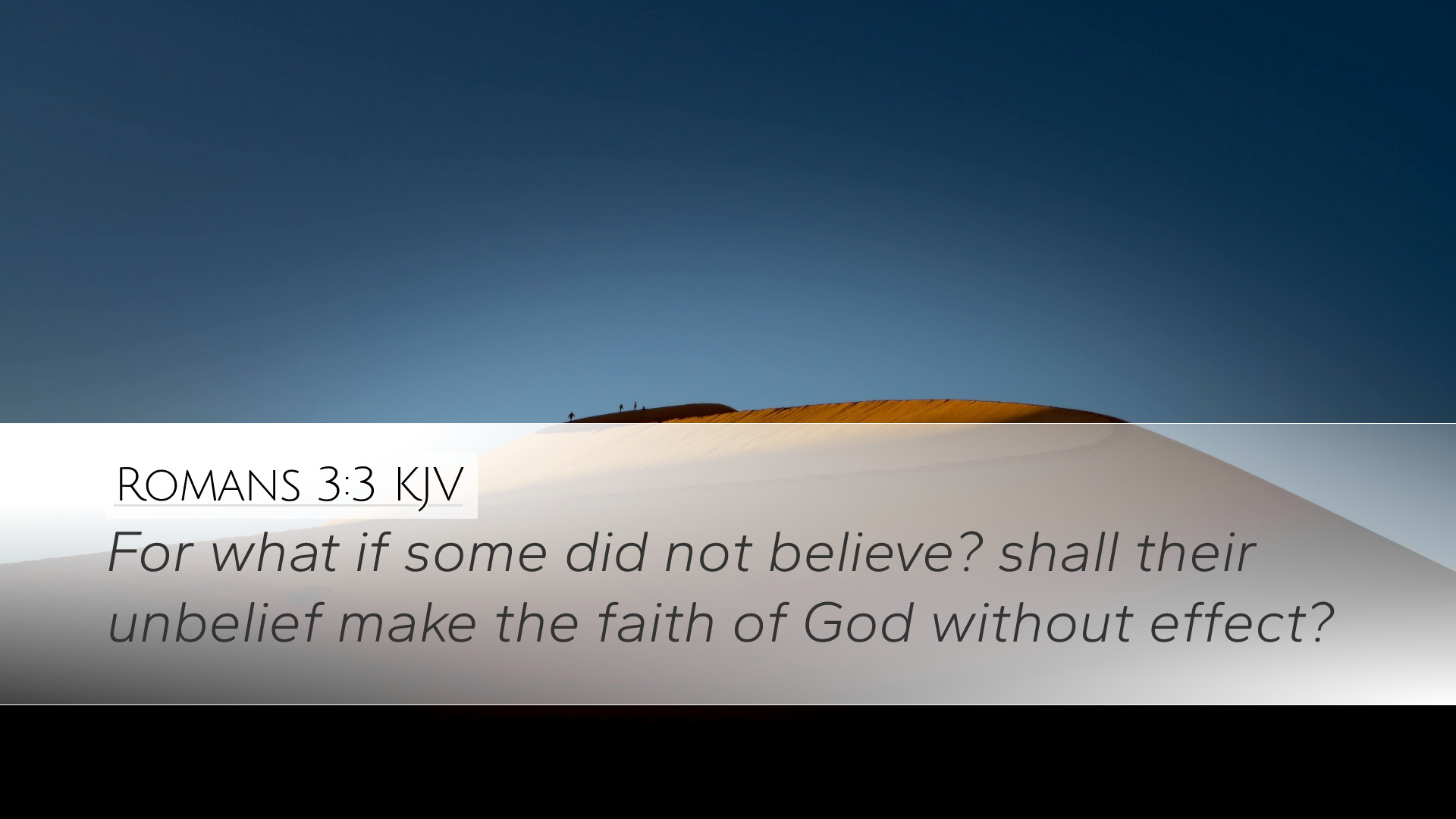Commentary on Romans 3:3
Romans 3:3 (KJV): "For what if some did not believe? shall their unbelief make the faith of God without effect?"
Introduction
This verse from the Apostle Paul’s epistle to the Romans addresses a critical aspect of faith and belief within the context of God’s promises. It confronts the question of human unbelief in relation to divine faithfulness, offering rich theological implications for pastors, theologians, and serious students of Scripture.
The Context of Faith
The Apostle Paul has been expounding on the righteousness of God, which is manifested through faith in Jesus Christ. In this particular verse, he continues to deal with the implications of Jewish unbelief in the face of God's promises.
Matthew Henry highlights the importance of not letting human unbelief undermine the nature of God's faithfulness. He insists that God's promises are not dependent upon human belief or disbelief, emphasizing the sovereignty of God’s will.
Unbelief and Its Consequences
Paul raises an important rhetorical question: “For what if some did not believe?” This acknowledges the reality of unbelief among some individuals, particularly within the Jewish community. Albert Barnes notes that while unbelief exists, it does not negate the truth and effectiveness of God's promises. Instead, it is a testament to the importance of faith in the Christian life.
- 1. The Reality of Unbelief: Paul does not shy away from confronting the existence of unbelief among God’s chosen people.
- 2. God’s Inviolable Promises: The faithfulness of God is intrinsic to His character, and thus, human disbelief cannot affect His Word.
God's Faithfulness
Adam Clarke elaborates on the idea that God's faith remains steadfast, even when individuals choose to reject Him. He states, "The believer may find comfort in the promises of God, knowing that they are not contingent upon the response of others."
This highlights a fundamental aspect of God’s nature: His faithfulness is independent of human actions or beliefs. Clarke emphasizes that God remains true to His Word, regardless of the disobedience or disbelief of humans.
The Implications for Believers
This verse serves as a cornerstone for understanding the dynamics of faith and doubt within the Christian life. For those who believe, the unwavering nature of God's covenant should encourage them to engage deeply with their faith.
- 1. Assurance of Faith: Believers can take comfort that their faith is valid and significant, despite the surrounding skepticism.
- 2. Encouragement to Evangelize: Knowledge that one’s faith stands firm even in a faithless generation calls Christians to share the Gospel boldly.
- 3. A Call to Reflect on Personal Belief: This scripture prompts individuals to examine the strength of their own faith, especially when faced with trials.
Theological Reflection
In a broader theological context, Romans 3:3 prompts discussion on the nature of divine sovereignty and human free will. Barnes posits that although God has a plan that unfolds through belief, human choice remains a significant factor in personal salvation and experience of God’s grace.
Thus, this verse reiterates the complexity of faith dynamics—wherein divine fidelity is juxtaposed with human action or reaction. It challenges the believer to trust in God's promise, even when faced with overwhelming evidence to the contrary.
Conclusion
Paul’s assertion in Romans 3:3 stands as a profound reminder of the relationship between divine faithfulness and human belief. As highlighted in the insights of Matthew Henry, Albert Barnes, and Adam Clarke, the faith of God remains intact, unshakeable by the fluctuations of human conviction.
This passage encourages a deeper understanding of God's unchanging nature and invites believers into a more robust faith that recognizes the reality of unbelief yet celebrates the unyielding promises of God. In an age where doubt may abound, the believer is assured that God's truth prevails, undeterred by human disbelief.


